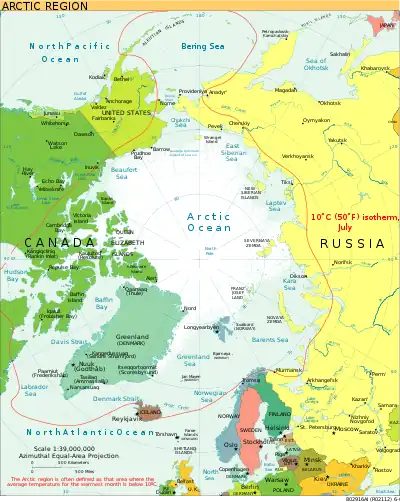Arctic Five
The Arctic Five[1][2][3] are the five littoral states bordering the Arctic Ocean: Canada, Denmark, Norway, Russia and the United States.[4]

Competing narratives exist regarding international governance of the Arctic.[5] There is debate over whether the principal actors should be the Arctic Five, the Arctic Council (the Arctic Five plus Finland, Iceland and Sweden) or a larger group of states.[6] In 2008, the Arctic Five concluded the Ilulissat Declaration causing concern among those not invited. The Arctic Council is perhaps the most important of the bodies involved in Arctic governance.[7] In a briefing note prepared for the 2016 Arctic Yearbook, Andreas Kuersten acknowledges a widespread view that the Arctic Five is usurping the Arctic Council's central position, but concludes that the two groups can complement one another in positive ways.[8]
Meetings of the Arctic Five
- May 27 – 29, 2008 in Greenland: Ilulissat Declaration. This meeting is known as the Arctic Ocean Conference.
- March 29, 2010 in Quebec: Chair Summary
- July 16, 2015 in Oslo, the Arctic Five adopted the nonbinding Declaration Concerning the Prevention of Unregulated High Sea Fishing in the Central Arctic Ocean, commonly known as the Oslo Declaration.[9] Subsequently, in the "Five-plus-Five process", the Arctic Five plus China, the European Union (EU), Iceland, Japan and Republic of Korea signed the legally binding Agreement to Prevent Unregulated High Seas Fisheries in the Central Arctic Ocean November 2017 in Washington.[10][11] The agreement came into force following ratification in June of 2021.[3]
References
- Klauss Dodds (2014). "Squaring the Circle: The Arctic States, "Law of the Sea," and the Arctic Ocean". Eurasia Border Review. 5 (1): 113–124.
These five states – Canada, Denmark/Greenland, Norway, Russia, and the United States – comprise the Arctic Five.
- "Commercial fishing banned in central Arctic Ocean as countries look to build scientific knowledge". July 13, 2021.
- "Arctic Five and fishing nations ban fishing". August 27, 2021.
- "Iceland".
Iceland is generally not regarded as an Arctic Ocean littoral State as its Exclusive Economic Zone (EEZ) is not adjacent to the high seas portion of the Central Arctic Ocean.
- Auerswald 2020, p. 252.
- Hønneland 2016, p. 19.
- Douglas C. Nord (2016). The Arctic Council: Governance within the Far North. Routledge. p. 16. ISBN 978-1-315-75619-6.
- Andreas Kuersten (2016). "Briefing note: The Arctic Five Versus the Arctic Council" (PDF). Thematic Network (TN) on Geopolitics and Security of the University of the Arctic.
- Nong Hong (2020). China's Role in the Arctic:Observing and Being Observed. Routledge. p. 22. ISBN 978-0-429-32813-8.
- Erik J. Molenaar (2019). "Chapter 9:Participation in the Central Arctic Ocean Fisheries Agreement". In Akiho Shibata; Leilei Zou; Nikolas Sellheim; Marzia Scopelliti (eds.). Emerging Legal Orders in the Arctic. Routledge. pp. 132–171. ISBN 978-0-429-46117-0.
- Joji Morishita (2019). "8 The Arctic Five-plus-Five process on central Arctic Ocean fisheries negotiations:Reflecting the interests of Arctic and non-Arctic actors". In Akiho Shibata; Leilei Zou; Nikolas Sellheim; Marzia Scopelliti (eds.). Emerging Legal Orders in the Arctic. Routledge. pp. 109–131. ISBN 978-0-429-46117-0.
Bibliography
- Auerswald, David P. (2020). "Arctic Narratives and Geopolitical Competition". In Weber, Joachim (ed.). Handbook on Geopolitics and Security in the Arctic: The High North Between Cooperation and Confrontation. Springer. pp. 251–271. doi:10.1007/978-3-030-45005-2. ISBN 978-3-030-45005-2.
- Hønneland, Geir (2016). Russia and the Arctic:Environment, Identity and Foreign Policy. I.B.Tauris. ISBN 978 0 85772 746 6.
- Rayfuse, Rosemary (2018). "Regulating Fisheries in the Central Arctic Ocean: Much Ado About Nothing?". In Vestergaard, Niels; Kaiser, Brooks A.; Fernandez, Linda; Larsen, Joan Nymand (eds.). Arctic Marine Resource Governance and Development. Springer. doi:10.1007/978-3-319-67365-3. ISBN 978-3-319-67365-3.